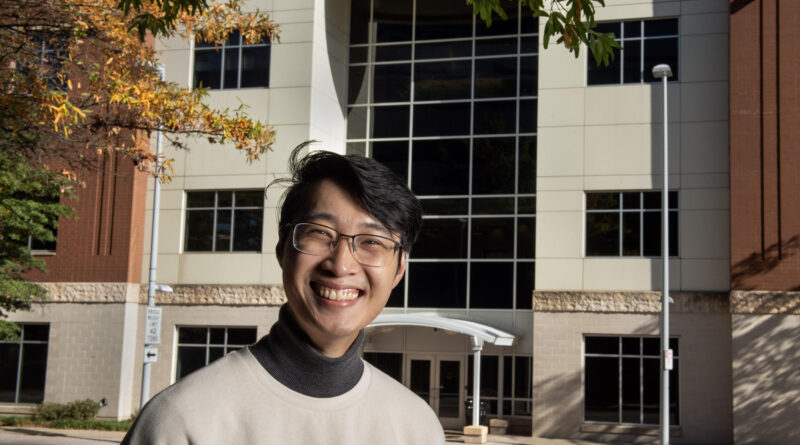How I got my research: Bao Chau uses the latest technology in hopes of improving the medical experience
How I Found My Research is an occasional series featuring VCU students sharing their journeys as researchers.
Bao Chau received a BS degree in chemical engineering from Virginia Commonwealth University in 2022, and is currently a student of the university’s pharmaceutical engineering Ph.D. program, a collaboration of the College of Engineering and the School of Pharmacy. His research focuses on easing the burden of drug development and increasing drug availability through the use of new machine learning techniques.
Chau was selected as an NSF Graduate Research Fellow last year after submitting his fellowship application to VCU’s Special Studies in Grantsmanship. Students at other universities usually start applying for grants at the end of their second year Ph.D. program, but this course gave Chau the opportunity to begin the research process during his first semester in the program.
Chau explained to VCU News what motivates him as a researcher and why the research process energizes him.
In two sentences, tell us the purpose of your research…and why it is important/impactful to all of us.
In all parts of the world, people face many health problems that require medical care, but access to such care may be financially impossible or unavailable. My goal is to create a path to better medicine by combining advanced chemistry and advanced machine learning.
What motivated you to pursue this type of research?
Health problems affect everyone at some point in their lives. Personally, my family faced many challenges in life, which put us in a difficult financial situation. We have benefited from creating solutions to our problems, but it is important to remember that most people do not have the same benefit. The stress that modern medicine places on people financially, physically and mentally is especially high in the United States. Seeing global problems and facing them firsthand is my reason to continue medical research and improve the lives of as many people as possible.
Tell us about a surprise on your research trip.
The most amazing thing about my research journey was how a spontaneous thought can turn into something revolutionary. Each meeting, short talk and presentation provided an opportunity to share knowledge, leading to the generation of small ideas with each interaction. I tried every idea I had, regardless of its quality or feasibility, and this method led to my first big success, at the end of be the main part of my thesis.
Tell us about an obstacle or challenge you had to overcome in your career.
Ph.D. mine, like many others, involved an untold number of mistakes that continue to this day. A major challenge in research has been to overcome these inherent limitations while remaining confident in your own feelings, thoughts and ideas. The first specific challenge I encountered was learning and applying machine learning to the field of chemistry. Before starting my Ph.D., I had little coding experience and no experience with machine learning. However, with time and effort, I was able to understand the concepts and apply them directly to chemistry, which resulted in the invention of a new method of improving chemical processes. away.
Is there a memorable collaboration or lesson you received along the way?
The most important lesson I learned during my Ph.D. it’s important to have a strong support system and surround yourself with quality people. There are a few memorable colleagues and mentors that I have worked with. This includes my wonderful lab colleagues who work in the same area as me, as well as my primary advisor and research advisor, Thomas Roper, Ph.D., director of pharmaceutical engineering and professor College of Engineering. Without them, I would be far from the person and researcher I am today. Their ability to be with me all the time, their patience for my ever-flowing thoughts, and their guidance and help on topics I don’t understand allows for significant personal growth. I am very grateful to all of them, and I hope that everyone can have the same system as mine.
What do you find satisfying about the research process?
I really enjoy the adrenaline rush that comes from finding a temporary success in the laboratory. However, what really motivates me about research is the idea that my work will have a significant impact on my field, advancing it to improve the quality of life for many people. In addition, I find satisfaction in the ability to inspire others to follow a similar path and give their opinion on current and future issues.
What advice would you give to undergrads starting their research journeys?
An important tip is to step outside of your comfort zone. It’s easy to stick to what you know and your routine, but pushing yourself beyond that can lead to great personal growth. When I was in first grade, I was quiet and kept to myself. However, I was able to take a small step and asked my current advisor, Dr. Roper, an opportunity to investigate, despite my nerves preventing me from making a coherent statement. Without that small step, I would not be where I am today. Every next step becomes easier to make your research journey successful, it all comes from that first step.
Subscribe to VCU News
Subscribe to VCU News at newsletter.vcu.edu and receive a selection of stories, videos, photos, news features and event listings in your inbox.
#research #Bao #Chau #latest #technology #hopes #improving #medical #experience
